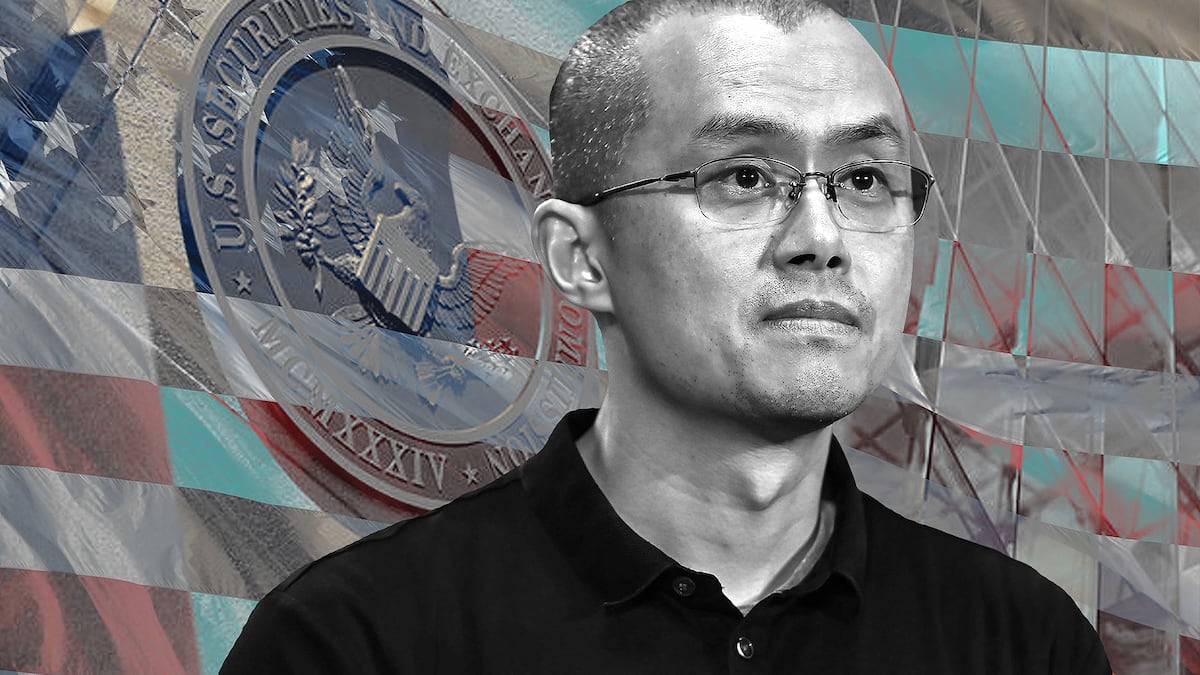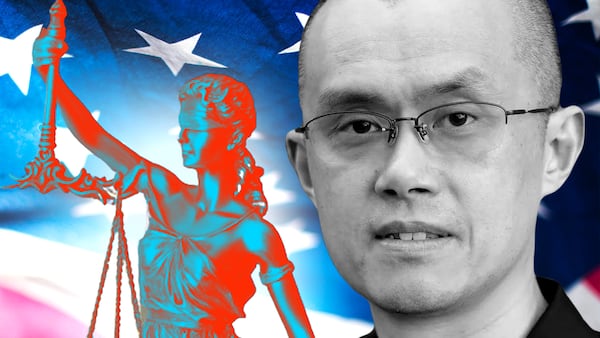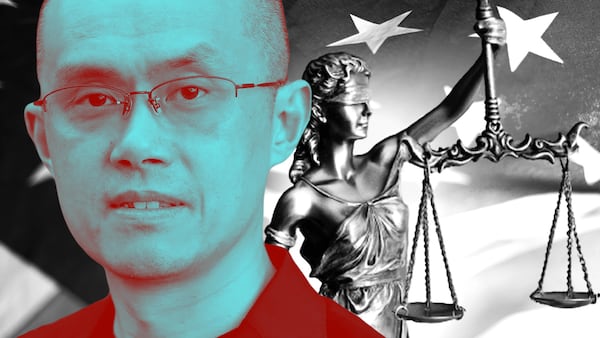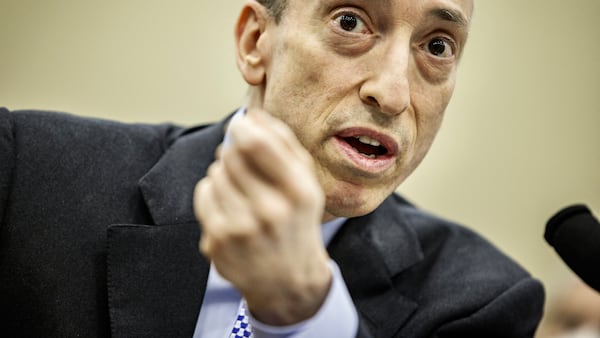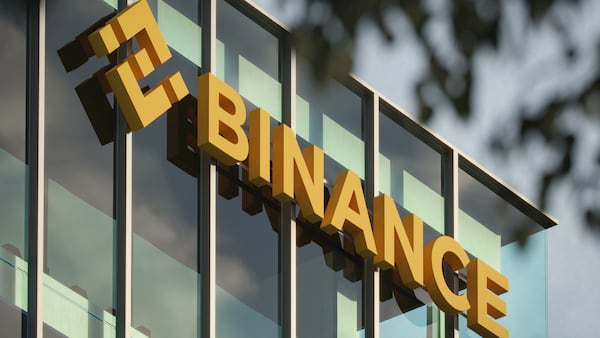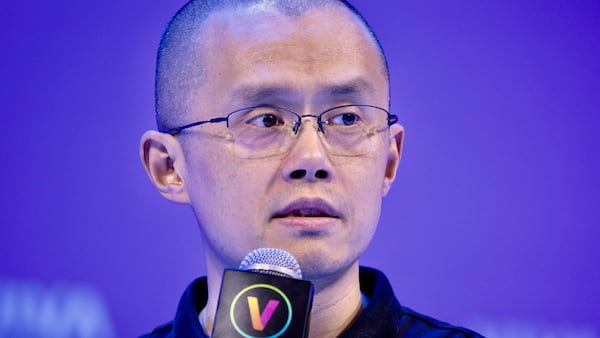- The settlement culminates one of the most anticipated legal actions in crypto history.
- Binance founder and CEO Changpeng Zhao agreed to step down as CEO and plead guilty to violations including wilfully breaking the Bank Secrecy Act.
- Binance itself agreed to plead guilty and pay $4.3 billion, Zhao will pay $50 million separately.
In the culmination of one of the most anticipated investigations in the history of the crypto industry, Binance founder and CEO Changpeng “CZ” Zhao agreed Tuesday to step down and plead guilty to willfully violating the Bank Secrecy Act.
Binance, the world’s biggest cryptocurrency exchange by volume, also agreed to plead guilty and pay $4.3 billion in fines and restitution. It is one of the largest payments the Department of Justice has ever received from a corporate firm, Attorney General Merrick Garland said. Separately, Zhao will pay $50 million for his violations. Binance has also agreed to retain an independent compliance monitor for three years.
Garland and Treasury Secretary Janet Yellen appeared together to announce details of the settlement. The head of the Commodity Futures Trading Commission, Rostin Benham, was also present.
“Binance became the world’s largest cryptocurrency exchange in part because of the crimes it committed — now it is paying one of the largest corporate penalties in U.S. history,” Garland said.
“The message here should be clear: using new technology to break the law does not make you a disruptor, it makes you a criminal.”
Changpeng Zhao plead guilty to willfully breaking the Bank Secrecy Act. He entered his guilty plea in person in the US on Tuesday, according to Garland.
Binance engaged in a deliberate and calculated effort to profit from the US market while skirting the regulatory controls in place there, Garland said. He also said that Binance “accommodated criminals” across the world.
The exchange turned a “blind eye to its legal obligations in the pursuit of profit,” Yellen said.
“Its willful failures allowed money to flow to terrorists, cybercriminals, and child abusers through its platform,” she added.
In a statement on X, formerly Twitter, Binance wrote that “We’re pleased to share we’ve reached resolution with several US agencies related to their investigations. This allows us to turn the page on a challenging yet transformative chapter of learning that has helped us become stronger, safer, and an even more secure platform.”
Extraordinary fall
Coming two-and-a-half-weeks after Sam Bankman-Fried was convicted on seven charges of fraud, conspiracy, and money laundering, the settlement marks an extraordinary fall for Zhao, who along with Bankman-Fried, had personified the billions to be made in the digital assets business.
Binance, the world’s largest crypto exchange with about $9 billion in daily trading volume, had long been rumoured to be under criminal investigation.
The case strikes as confidence was rebounding in the cryptocurrency market thanks largely to anticipation that US regulators are poised to approve a spot price Bitcoin exchange-traded fund.
Binance-affiliated BNB coin fell about 9% on Tuesday morning after the DOJ said it planned to announce “significant cryptocurrency actions” later in the day, but rebounded slightly after The Wall Street Journal reported that one of those actions would be a settlement with Binance. BNB is now down about 4% so far this year.
Bitcoin fell roughly 2% on Tuesday morning but rebounded after The Wall Street Journal published its report.
Following the DOJ’s press conference, BNB and Bitcoin were relatively unchanged.
Binance announced that the company’s new CEO would be Richard Teng, its former Global Head of Regional Markets. Before joining Binance, Teng was the CEO of the Financial Services Regulatory Authority at Abu Dhabi Global Market, the Chief Regulatory Officer of the Singapore Exchange (SGX), and the Director of Corporate Finance in the Monetary Authority of Singapore.
In a post on X, Teng said he will work with regulators to “uphold high standards globally that foster innovation while providing important consumer protections.”
Zhao wished his successor the best on X and then signed off by saying he will “remain available to the team to consult as needed, consistent with the framework set out in the plea deal.”
Today, I stepped down as CEO of Binance. Admittedly, it was not easy to let go emotionally. But I know it is the right thing to do. I made mistakes, and I must take responsibility. This is best for our community, for Binance, and for myself.
— CZ 🔶 BNB (@cz_binance) November 21, 2023
Binance is no longer a baby. It is…
Opaqueness and fraud
The settlement may solidify sentiment that crypto remains a lawless marketplace riven by the very deficiencies blockchain technology was supposed to eradicate — opaqueness and fraud.
The Binance news landed just weeks after Bankman-Fried was found guilty of charges related his scheme to plunder customer deposits at FTX, the crypto exchange he co-founded, to cover losses in his investment fund.
Meanwhile, US government agencies had pursued a pair of civil actions against Binance and Zhao earlier this year.
In March, the US Commodity Futures Trading Commission charged Binance, Zhao, and Samuel Lim, the company’s former chief compliance officer, with evading federal laws and operating an illegal exchange. The lawsuit painted a picture of an organisation that routinely ignored best practices and failed to comply with anti-money laundering rules.
The CFTC also said Binance unlawfully failed to register digital assets as commodities, even though it was serving US customers.
Then in June, the US Securities and Exchange Commission accused Zhao and Binance entities of similar charges.
The SEC alleged that Binance and Zhao generated $11.6 billion in revenue from US customers even though it was unlicensed, and that the company and its US affiliate redirected billions of customer assets to investment funds controlled by Zhao, similar to the charges made against Bankman-Fried.
Binance denies allegations
Binance and Zhao denied the SEC’s allegations and said the agency had neglected to negotiate on a potential resolution.
In September, Binance attempted to have the SEC’s lawsuit against it dismissed, arguing the agency was “seeking to achieve by litigation what it lacks by legislation” — namely, a comprehensive regulatory regime for crypto. The SEC responded in October by calling Binance’s arguments “absurd.”
In charging Binance and Zhao, prosecutors are challenging what may be the most influential organisation and CEO in the global digital assets industry.
The centralised exchange boasts more than $73 billion in assets and executes trades for investors in more than 350 cryptocurrencies, according to CoinMarketCap. Its customer service department speaks 40 languages. And at the end of the third quarter, it held a 44% share of the exchange market.
Financial supermarket
The six-year-old company is far more than an exchange where investors buy and sell Bitcoin, Ether, NFTs and other digital assets.
Binance is a financial supermarket with an array of products ranging from sophisticated derivatives for institutional investors to credit and debit cards to wallets and custody services. It even has a charity arm “powering blockchain for good.”
Yet unlike traditional bourses such as Nasdaq or the London Stock Exchange, Binance is not heavily regulated. That is largely by design, regulators say.
‘They think about a headquarters, an office, a bank account, a registration, et cetera. But today you can run organisations with probably none of those.’
— Changpeng Zhao, Binance
Zhao, a 46-year old China-born Canadian who earned a computer science degree at McGill University, has taken pride in a business model that breaks from the bricks-and-mortar approach of traditional financial institutions.
Binance has no headquarters and maintains employees in work-share spaces around the world. Zhao also manages a constellation of operating entities in more than 100 nations.
“They think about a headquarters, an office, a bank account, a registration, et cetera,” Zhao said in an interview with Decrypt in 2021. “But today you can run organisations with probably none of those.”
Regulatory scrutiny
Yet this byzantine, everywhere-but-nowhere business model has drawn the scrutiny of regulators. The SEC cited Binance’s “opaque web of corporate entities” in its lawsuit against the firm.
As a result, it shared little in the way of detailed accounts of its financial performance, balance sheet, or corporate structure. While Zhao vowed to make compliance with regulations a top priority at Binance in 2023, he also urged supporters shrug off criticism.
“Ignore FUD, fake news, attacks etc,” he tweeted on January 2.
UPDATE: Added Binance’s tweet.
UPDATE: Added information about Binance’s new CEO, Richard Teng.
Adam Morgan McCarthy is DL News’ London-based Markets Correspondent. Got a tip? Reach out at adam@dlnews.com.


